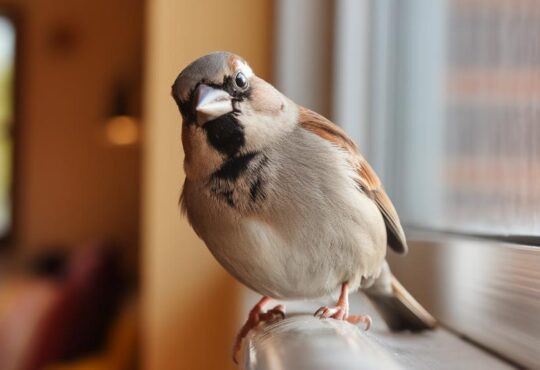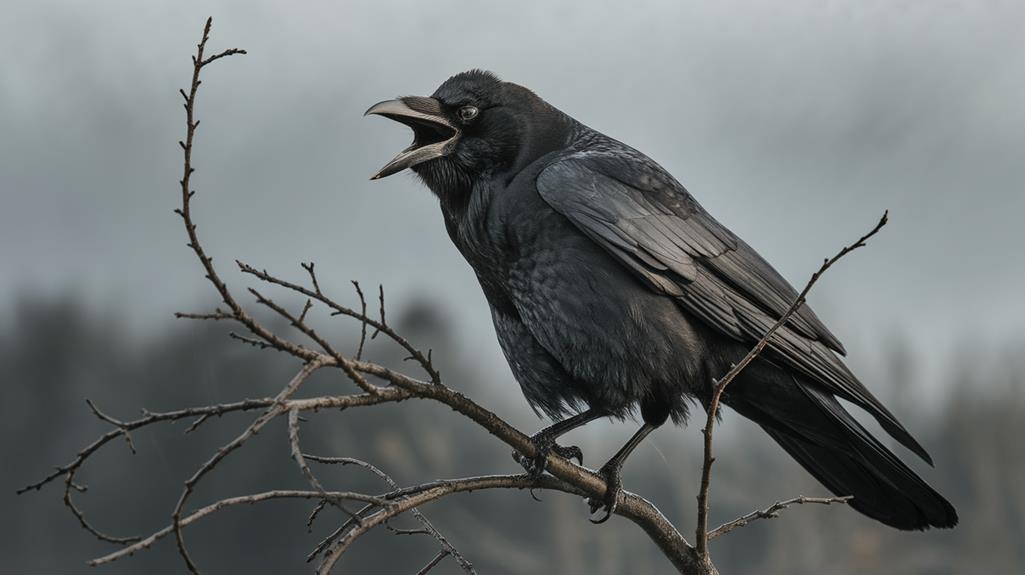
Crow Cawing Meaning: Ancient Messages & Sacred Signs Revealed
When you hear a crow's caw, you're receiving a message from the spiritual domain. Crows use diverse vocalizations to communicate complex ideas, with each sound carrying specific meanings. A single caw might be a greeting, while three caws signal danger. The number of caws, their pitch, and timing all contribute to the message's interpretation. In many cultures, crows are seen as spiritual guides, connecting the physical and spiritual worlds. Their calls can warn of challenges or herald good fortune, depending on the context. By understanding crow vocalizations, you'll gain deeper insights into nature's wisdom and your own spiritual journey. The mysteries of crow language await your investigation.
Decoding Crow Vocalizations
Through their diverse array of vocalizations, crows communicate a complex language that goes far beyond simple immersion. As social species, crows utilize a rich tapestry of sounds to convey intricate meanings and emotions, weaving a sonic web that connects them to their kin and environment.
When decoding crow vocalizations, you must attune yourself to the subtle nuances of their caws, rattles, clicks, and coos. Each sound carries a specific purpose, a message waiting to be unraveled by those who listen with both ears and heart.
The caw, perhaps the most recognizable of crow calls, serves as a versatile tool in their communication arsenal. A single caw may be a greeting, a gentle acknowledgment of your presence in their domain. Multiple caws, on the other hand, can signal danger or territorial warnings, urging you to pay heed to the unseen forces at play.
Context is key in interpreting these avian messages. The pitch and volume of their calls shift with the tides of circumstance, revealing deeper layers of meaning. Soft, melodious coos during courtship speak of love and connection, while sharp, urgent cries alert others to impending threats.
Spiritual Significance of Crow Calls
Beyond the physical territory of crow communication lies a deeper, more mystical layer of interpretation. The spiritual meanings of seeing and hearing crow calls can offer profound insights into your life's journey. When you encounter crow cawing, it's often believed to be a message from the spiritual dimension, conveying guidance from departed loved ones or spiritual guides.
The context and patterns of crow calls hold significant spiritual symbolism:
| Number of Crows | Spiritual Meaning |
|---|---|
| One crow | Bad luck |
| Two crows | Good tidings |
| Three crows | Health blessings |
| Four crows | Encouragement |
| Persistent caws | Intuitive insight |
Morning calls typically signify good fortune and positive energies, while nighttime cawing may warn of impending challenges. Three crows cawing together are particularly auspicious, symbolizing blessings of health and well-being. When you hear persistent crow calls, it's a reminder to remain open to your inner wisdom and pay attention to the subtle messages around you. These avian messengers encourage you to trust your intuition and accept the spiritual guidance they offer, helping you navigate life's complexities with greater awareness and understanding.
Crow Communication in Nature
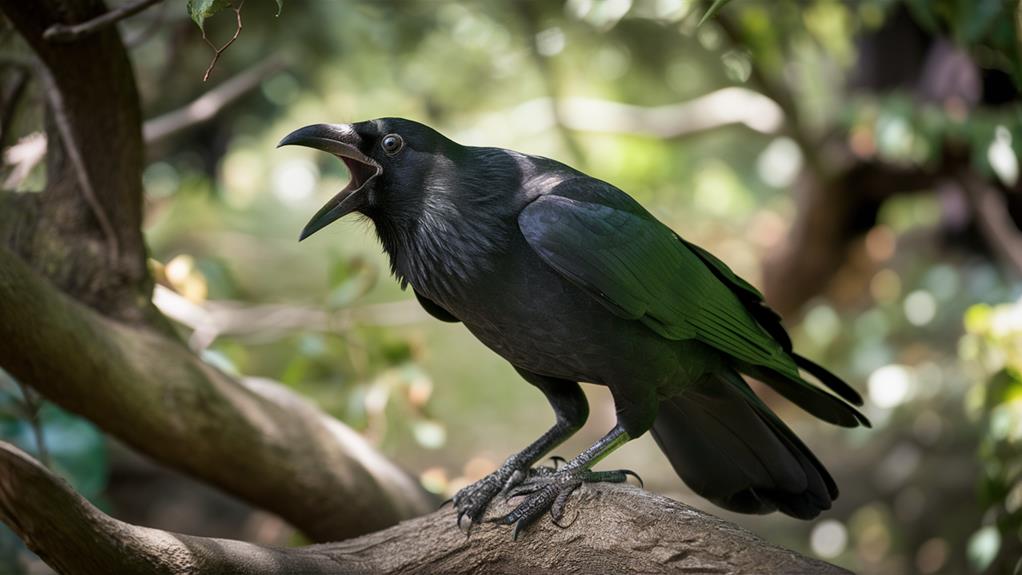
Crows are nature's master communicators, employing a sophisticated array of vocalizations to convey messages within their social groups and across their territories. Their cawing, far from being mere noise, is a complex language that bridges the physical and spirit domains.
You'll find that these intelligent birds use a variety of calls, each with distinct meanings that shift based on context and repetition. As you observe crows in nature, you'll notice that the number of caws often carries specific significance. A single caw may be a greeting, while three in succession could signal danger. Four or more caws often serve as a territorial warning, echoing the crow's role as a guardian of both earthly and spiritual boundaries.
Their communication extends beyond simple cawing, incorporating rattles, clicks, and coos that weave a rich tapestry of avian discourse. The crow's remarkable ability to mimic over 100 sounds, including human speech, hints at their profound connection to both our world and the unseen.
This adaptability in communication reflects the crow's spiritual symbolism as a messenger between domains, bridging the gap between the mundane and the mystical.
Cultural Interpretations of Crow Cawing
Across cultures, the cawing of crows resonates with deep spiritual significance. You'll find that many societies view these vocalizations as important messages from the spirit dimension, often heralding significant life changes or warnings. Indigenous beliefs, in particular, regard crows as highly intelligent spiritual guides, their caws serving as a call to heighten your awareness and trust your intuition.
The cultural interpretations of crow cawing are diverse and profound. You may encounter beliefs that link the number of crows cawing to specific fortunes or misfortunes, each count carrying its own symbolic meaning. This connection to wisdom and foresight underscores the crow's role in spiritual awakening and guidance.
| Number of Crows | Interpretation | Significance |
|---|---|---|
| One | Solitude | Self-reflection |
| Two | Good fortune | Balance and harmony |
| Three | Life change | Accept change |
As you listen to the caws of these mysterious birds, keep in mind that they're often seen as reminders to stay true to your path. Their calls may be urging you to connect with nature, explore introspection, and remain open to the wisdom that surrounds you in unexpected forms.
Emotional Responses to Crow Sounds
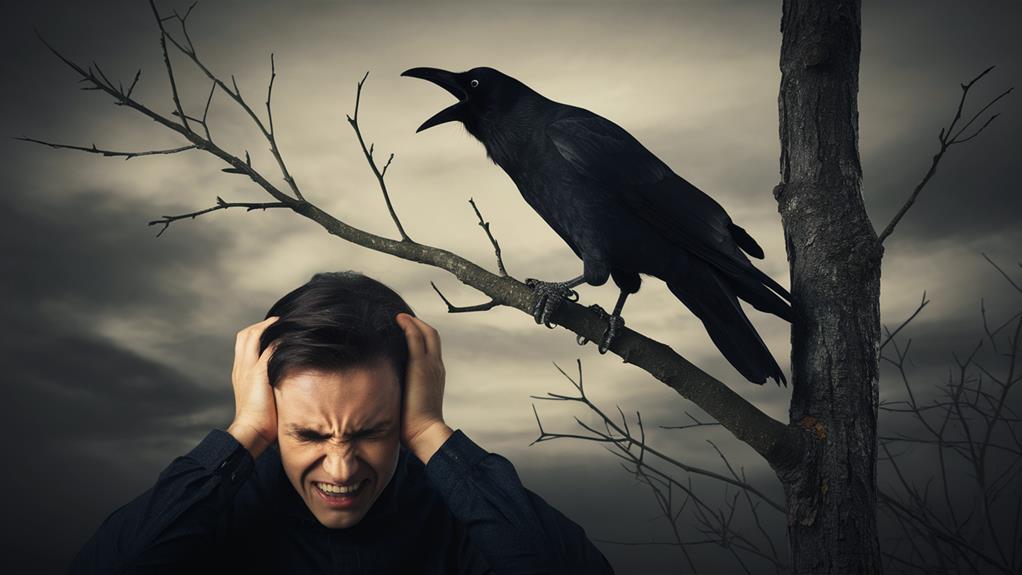
While many people focus on the cultural interpretations of crow calls, it's additionally vital to reflect on the emotional responses these sounds can evoke. Crow vocalizations are more than mere cawing; they're a complex language that mirrors the depth of their emotional intelligence. You might find yourself drawn into their domain as you listen closely to their varied sounds.
The crows' alarm calls, like the sharp "Ca-caw," can stir a primal sense of alertness within you, connecting you to the collective consciousness of nature's warning system. As you attune yourself to their communication, you'll uncover a rich tapestry of emotional expression.
The gentle coos between mated pairs speak of love and affection, while the clicks of juveniles reveal the tender bond between parent and child.
Crow vocalizations offer a window into their social dynamics, revealing a sophisticated emotional terrain. You may even find that local crows develop unique calls just for you, a spiritual acknowledgment of your presence in their domain.
Crow Caws and Weather Prediction
Nature's feathered forecasters have long intrigued those attuned to their caws. Crows, with their keen awareness of environmental shifts, offer you a window into the subtle language of the natural world. Their increased vocalizations before storms serve as a cosmic alarm, alerting you to impending changes in the atmosphere.
You'll notice that as weather patterns shift, so too does the cawing of these ebony messengers. Their calls become more frequent and intense, reflecting the unseen forces at play in the skies above. This heightened communication isn't merely noise; it's a sacred dialogue with the elements.
Crows, in their wisdom, are responding to fluctuations in barometric pressure, a sensitivity that connects them to the very pulse of the Earth.
As rain approaches, you may witness these birds engaging in more social vocalizations. This gathering of voices is an indication of their collective intuition, a shared preparation for the cleansing waters to come.
Timing and Frequency of Caws
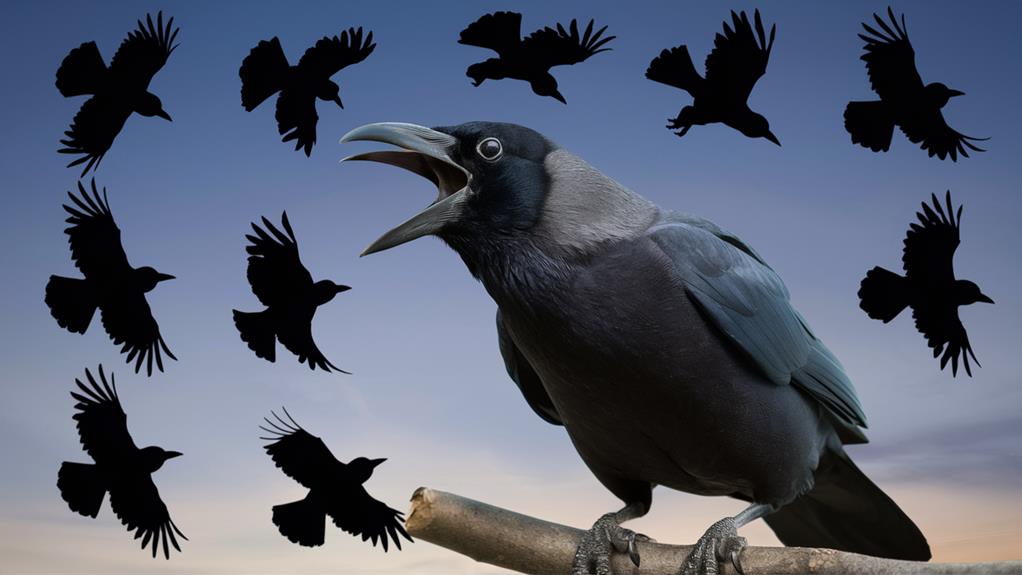
The intricate language of crow caws extends beyond mere sound, delving into the domain of timing and frequency. You'll find that the time of day when crows vocalize can reveal profound meanings. Morning cawing often heralds good fortune and openness to blessings, while night-time calls may warn of potential dangers lurking in the shadows.
The frequency of caws, likewise, carries significance in this avian dialogue. When you hear cawing three times, prepare for change on the horizon. This triad of calls signals a shift in your path, urging you to remain adaptable. Four caws, on the other hand, speak of stability and a solid foundation, reassuring you of your current position.
Persistent cawing, especially during specific times, reflects the crow's assessment of its surroundings. This continuous vocalization serves as a call to action, heightening your awareness of the environment.
The number of caws additionally plays a role in crow social dynamics. Different patterns indicate various interactions and environmental cues, offering you a glimpse into their complex communication system. By attuning yourself to these subtle variations, you'll develop a deeper connection with nature's messengers.
Distinguishing Different Crow Calls
Beyond timing and frequency, you'll find that crows possess a rich repertoire of vocalizations. Their cawing, rattles, and clicks serve as a mystical language, conveying messages that resonate with the natural world. As you attune yourself to these crow vocalizations, you'll begin to unravel the meanings behind their calls, connecting with the ancient wisdom they carry.
The universe speaks through these ebony messengers, and it's your task to listen. A single caw, a greeting from the spirit dimension, invites you to acknowledge the crow's presence. When you hear three crows cawing in unison, stay alert, for they warn of potential dangers lurking in the unseen. Four or more caws signal a territorial claim, reminding you to respect the boundaries of both the physical and spiritual domains.
Crow vocalizations extend beyond simple caws, encompassing a range of pitches and energies. High-pitched calls often herald the revelation of sustenance, while lower, rhythmic calls speak of companionship and tranquility.
Crow Language and Human Interaction
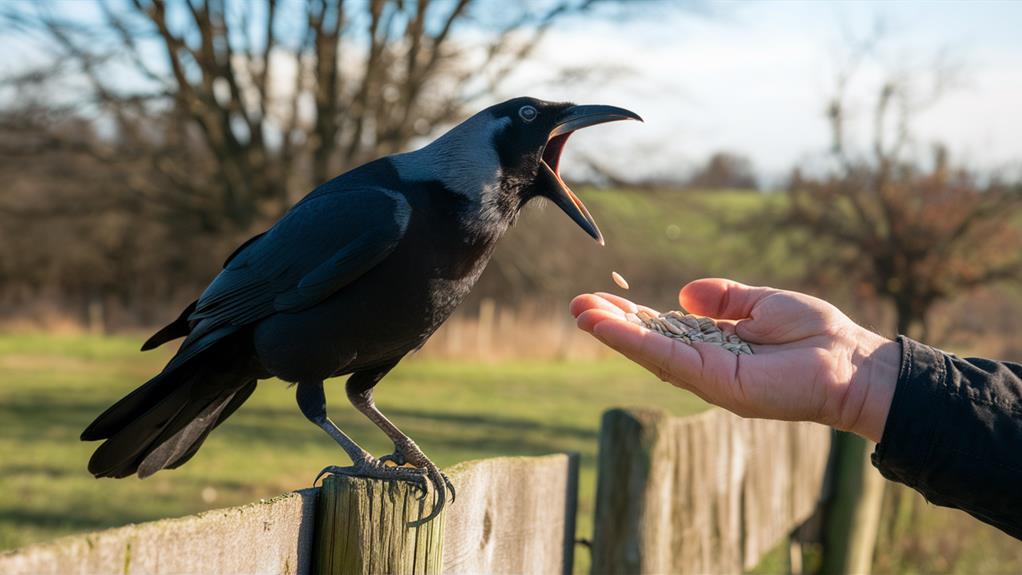
Crows' remarkable ability to communicate extends beyond their own species, bridging the gap between avian and human worlds. Their sophisticated vocalizations, including cawing, clicks, and rattles, convey specific messages related to social interactions and environmental cues. You'll find that crows can even mimic human speech, showcasing their adaptability and intelligence.
The crow spirit, deeply connected to communication, manifests in their unique calls for individual humans. This spiritual bond is strengthened through consistent feeding habits, leading to greater trust and interaction. As you observe and nurture this relationship, you may witness crows leaving gifts or engaging in specific vocalizations to express gratitude.
| Crow Behavior | Human Interaction |
|---|---|
| Distinct Caws | Feeding Routines |
| Mimicry | Gift Offerings |
| Unique Calls | Trust Building |
| Food Signals | Social Bonding |
Research has shown that crows recognize and respond to specific calls associated with food offerings. This illustrates their remarkable learning capabilities and improves human-crow interactions. By understanding and respecting the crow's language, you open a channel of communication with these intelligent creatures, promoting a deeper connection to the natural world and the spiritual domain they represent.
Scientific Research on Crow Vocalizations
Scientific research has shed light on the intricate domain of crow vocalizations, revealing a complexity that surpasses initial assumptions. The American Crow, a mystical creature of the skies, possesses a vocal repertoire that speaks to the interconnectedness of all beings. Their cawing, once thought simple, now reveals a language rich with meaning and purpose.
As you explore the sphere of crow communication, you'll uncover their calls serve as bridges between the physical and spiritual worlds. Studies have shown these intelligent birds can differentiate between alarm calls for various predators, demonstrating an awareness that transcends mere instinct.
Their ability to recognize individual calls suggests a deep understanding of social dynamics, mirroring the complex relationships we humans navigate. The crow's adaptability in vocalizations reflects the fluid nature of the universe itself.
They learn and mimic sounds from their environment, reminding us of our own capacity for growth and change. As researchers continue to decode the nuances of crow language, they reveal the profound wisdom hidden within nature's symphony.
Each caw, click, and rattle serves as an indication of the crow's role as a messenger between domains.
Most-Asked Questions FAQ
What Does It Mean When a Crow Caws?
When a crow caws, you're witnessing complex crow communication styles. Cawing variations convey different messages, from greetings to warnings. By analyzing crow behavior, vocalization patterns, and cawing frequency, you'll understand their territorial claims and social interactions better.
What Does It Mean When Crows Are Really Noisy?
When crows are really noisy, they're likely communicating something important. Their cawing behavior could signal threats, territorial disputes, or food findings. Crow communication varies with seasons and social interactions, so the noise significance depends on the context you're observing.
Why Is a Crow Cawing Outside My Window?
A crow's cawing outside your window could indicate various aspects of crow behavior and communication. It might be marking its territory, warning of danger, or calling its flock. In folklore, crow symbolism often connects to spiritual messages or omens.
What Does a Black Crow Represent Spiritually?
A black crow represents spiritual guidance in your life. It's a symbol of transformation, urging you to trust your intuition. As an omen, it connects you to ancestral wisdom and delivers intuitive messages, encouraging you to welcome change.

